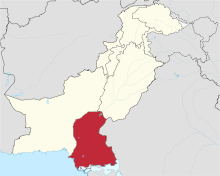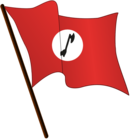Human rights abuses in Sindh: Difference between revisions
| Line 39: | Line 39: | ||
* [[Human rights abuses in Manipur]] |
* [[Human rights abuses in Manipur]] |
||
* [[Human rights abuses in Assam]] |
* [[Human rights abuses in Assam]] |
||
* [[Rape in Jammu and Kashmir]] |
|||
==References== |
==References== |
||
Revision as of 20:05, 2 September 2012
| Human rights abuses in Sindh | |
|---|---|
 Location of Sindh (highlighted in red) | |
| Location | Sindh, Pakistan |
| Date | Ongoing |
| Target | Civilians and combatants |
| Perpetrators | Pakistani security forces |
| Motive | Military clampdown |
Human rights abuses in Sindh have been compared by prominent academic Noam Chomsky to the situation of human rights abuses in Balochistan.[1] The Pakistani Army and ISI have conducted operations of involuntary disappearances, detentions, and torture on the Sindhi and Baluch political activists. Once caught, these detainees are held in 'safe houses' of intelligence agencies.[2] The massive scale of human rights violations has resulted with concern in the United States of America, often indifferent to the fates of smaller nationalities in Pakistan.[3]
Abductions
Well known activist in the Sindhi nationalist movement Dr Safdar Sarki was one of the many disappeared during the period of Gen. Pervez Musharraf's rule, the campaign to "find" him and get him released included prominent human rights organizations, including Amnesty International,[4] and the Asian Human Rights Commission calling for his release, while the New York Times and other news organizations reported that his health was in jeopardy because the Pakistani government refused to allow him necessary medical attention.
Religious persecution
There have been many cases of religious persecution in Sindh. Among these, the most recent include 19 year old Hindu girl Rinkle Kumari from Mirpur Mahelo in Ghotki district, Sindh province who was abducted a gang and "forced" to convert to Islam, before being head shaved.[5]
Another recent case was the gunning down of four Hindu doctors in Chak town, Shikarpur sparking fears and panic among the minority community.[6]
Political persecution
There have been many cases of political persecution in Sindh. Much of the persecution is linked to Sindh's provincial government, and is undertaken by Karachi's Crime Investigation Agency (CIA).[7] Many human rights abuses were committed under the tenure of Chief Minister Jam Sadiq Ali, who took office from August 6, 1990 to March 5, 1992. Under his tenure, Sindhi independence leader GM Syed was placed under house arrest until his death; however Jam Sadiq's death in 1992 did not cause these acts to cease. Following his death, his seat was contested between his son, Jam Ashiq Ali and a Pakistan Peoples Party member, Shahanawaz Junejo. Ali's supporters undertook intimidation of PPP activists and Shahanawaz Junejo, as well as 200 other opposition activists who were detained.[7]
Target killings
Target killings are common in Karachi, with Continuous target killings in July 2011 claiming the lives of over 300 people.[8] They are often politically motivated.
See also
- Human rights violations in Jammu and Kashmir
- Human rights abuses in Manipur
- Human rights abuses in Assam
- Rape in Jammu and Kashmir
References
- ^ http://www.crisisbalochistan.com/secondary_menu/human-rights/letter-from-noam-chomsky-the-situation-in-pakistan-is-volatile-the-number-of-disappearances-astounding.html
- ^ http://www.worldsindhi.org/publishedreports/reports/pdf_for_website.pdf
- ^ The Foreign Policy of Pakistan: Ethnic Impacts on Diplomacy, 1971-1994 Mehtab Ali Shah ISBN 1-86064-169-5
- ^ Download Documents | Amnesty International
- ^ http://www.nytimes.com/2012/03/26/world/asia/pakistani-hindus-say-womans-conversion-to-islam-was-coerced.html?pagewanted=all
- ^ http://articles.timesofindia.indiatimes.com/2011-11-08/pakistan/30372661_1_southern-sindh-province-pakistan-hindu-council-minority-community
- ^ a b Human Rights in Developing Countries - Yearbook - Peter R. Baehr" Cite error: The named reference "Human Rights in Developing Countries - Yearbook" was defined multiple times with different content (see the help page).
- ^ Karachi violence, over 100 dead, Express Tribune
Further reading
- Sindh: Human Rights Abuses Continue Against Fishing Communities - UNPO
- The Foreign Policy of Pakistan: Ethnic Impacts on Diplomacy, 1971-1994 Mehtab Ali Shah ISBN 1-86064-169-5
- Human Rights: Commitment and Betrayal - M. G. Chitkara ISBN 81-7024-727-6
- Human Rights: Annual Report 2004 - Foreign and Commonwealth Office
- Globe, Volume 11, Issues 2-6

